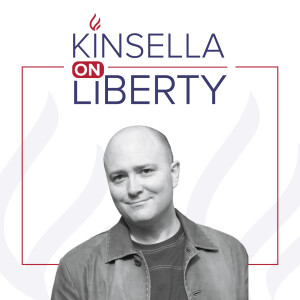
KOL130 | Bad Quaker: Kinsella and Tucker on Abortion, …
 2014-05-24
2014-05-24
Download
Right click and do "save link as"
Kinsella on Liberty Podcast, Episode 130.
From the Bad Quaker podcast with host Ben Stone, Jeff Tucker and I discuss a variety of libertarian issues, including abortion and the like.
Update: Here is the (lightly edited) text of the email I sent Tucker and Stone a few hours before the podcast, that was alluded to at the end:
There is something I've been chewing over in my mind lately that I've been thinking about discussing or putting on a podcast, and I'll briefly mention below, in case you two think this is worth talking about.
It concerns the interrelationship between concepts of aggression, self-ownership, and homesteading of external resources. Basically libertarians sometimes treat aggression as a primary, and then struggle with including trespass to property as a case of it, ... so then some of them finally admit that aggression depends on property rights-you need to know who owns an apple before you can tell if someone's forceful taking of it (or keeping of it) is "aggression or not." But then you get them turn around and apply property-ownership principles that apply to the apple--like contracts and homesteading--back to one's body, after all one is a "self-owner" and therefore, "just like" the way you own the apple was by homesteading and you can have a contract to sell it, you also gain ownership of your body by homesteding and you can also sell it (voluntary slavery). I think Walter Block employs a version of this reasoning, and I've heard others employ variations of it.
(A similar fallacy is the twin pair of related ideas: if you own something, that implies that you can sell it; and if you sell something, that implies you must own it first. The former idea, which is based on a flawed idea about the origin and nature of property rights and contract theory, is used to justify voluntary slavery; the second, which is based on a flawed understanding of contract theory, is used to justify intellectual property.)
I've thought about this of the years, and kept toying in my mind with Rand's (to my mind original) expression of the non-initiation of force principle. Similar to the way I toyed with self-ownership and finally figured it out due to Hoppe's insights on this very topic, combined with his singular focus on economic scarcity as the touchstone of property (something Rothbard didn't do, whcih is why he went astray on IP and a couple other fairly minor issues having to do with contract theory). Rand didn't do it either, which is why she also was a bit fuzzy, beyond her NAP. What Hoppe made me realize (as I discuss in How We Come To Own Ourselves) is that there is a difference in the basis of property rights in one's body, and in external resources. It is a difference that is already partially implicit in the elementary formulation of the NAP itself, as Rand and Rothbard formulated it.
The difference is this. it is not homesteading that is primary. It is the objective link--some objective, demonstrable link between the owner/claimant and the resource in dispute (an "intersubjectively ascertainable" link, as Hoppe might say in Kantian terms). The purpose of property rights is to allocate or determine an owner of a disputed resource, in the case of a dispute, so as to avoid conflict and to permit resources in general to be used productively. Thus the allocation rule has to be based on some objective criteria, not on something arbitrary, particularizable, or mere verbal decree--since the latter types of basis for deciding who owns something does not fulfill the function of property rights--of avoiding conflict, since if the rule is inherently arbitrary or unfair or particularizable then we cannot expect the people on the receiving end to respect it, so there will just be confict once more (might makes right; war of all against all). And any number of people could simultaneoulsy verbally claim the resource, so that could never be a good way. It has to be an objective criterion that everyone can see ...
view more
More Episodes
012345678910111213141516171819
Create your
podcast in
minutes
- Full-featured podcast site
- Unlimited storage and bandwidth
- Comprehensive podcast stats
- Distribute to Apple Podcasts, Spotify, and more
- Make money with your podcast
It is Free
- Privacy Policy
- Cookie Policy
- Terms of Use
- Consent Preferences
- Copyright © 2015-2024 Podbean.com





